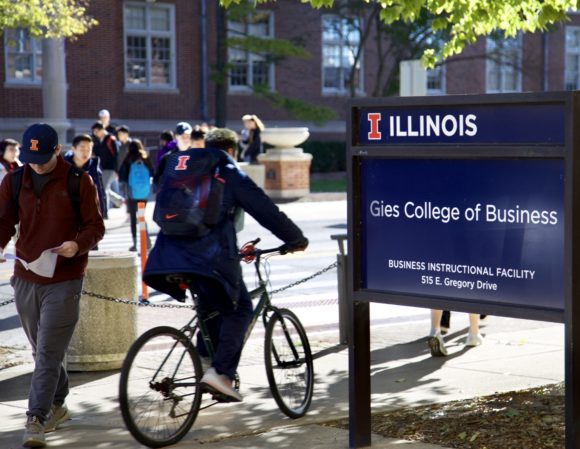After becoming dean of the University of Illinois business school in 2015, Jeffrey Brown worried that politics or a virus would choke off a major source of revenue for his school: Chinese graduate students.
So, in 2017, along with the engineering school, Brown bought insurance worth up to $61 million to protect the university against such losses, including $36 million due to a pandemic. His worst fears came true earlier this year when the coronavirus hit.
But despite his foresight, things have not gone as planned.
A Reuters review of emails between school officials and insurance brokers, and interviews with people familiar with the situation show the university may get a payout to cover lower tuition revenue this year, but it can no longer get pandemic, visa restriction, or sanctions coverage.
How the university, which first made headlines for its pioneering insurance coverage in late 2018 as the Trump administration ramped up its anti-China policies, lost the protection just when it needed it the most is detailed here for the first time. While it is known that insurers pulled back from various types of coverage in recent months and raised prices, the account provides new insight into how quickly the market deteriorated.
The university opened negotiations to renew its 2017 policy, which was scheduled to expire in May 2020, as early as the fall of last year, according to the emails, which were obtained by Reuters through a Freedom of Information Act request.
The policy could have been renewed by Christmas last year, but a bureaucratic misstep necessitated a new broker, delaying the process, according to the emails and two of the sources. That meant the virus hit as brokers at a Marsh & McLennan Co. Inc. unit that took over were negotiating the renewal with lead insurer AXA XL through the Lloyd’s of London insurance marketplace.
As weeks passed and the virus progressed, renewal options rapidly narrowed while costs increased. The university is now exploring a possible claim for the current year, according to the emails.
“We can hope the insurer/reinsurer outlook would be clearer in a year’s time,” Marsh executive Tarique Nageer wrote in an April 29 email to university officials.
A University of Illinois at Urbana–Champaign spokeswoman declined to comment. A Marsh spokeswoman declined to comment on behalf of the company and Nageer. AXA XL, a unit of AXA SA , and Lloyd’s of London declined comment.
NIGHTMARE SCENARIO
About 1.1 million foreign students attended U.S. higher education institutions in the 2018-19 school year and contributed nearly $45 billion to the country’s economy in 2018, according to the Institute of International Education. For a graphic, click https://tmsnrt.rs/30Ywem9
That ecosystem faces an existential threat as travel restrictions look set to keep many foreign students home this fall.
Brown had long worried about such a possibility. In an interview in February 2019, he told Reuters that his “nightmare scenario back in 2017 was that we would have a big flu scare that caused none of the students to show up on campus.”
About half of the graduate students at the Gies College of Business and 27% at the engineering school were from China and Hong Kong, university officials said.
Brown, who served as senior economist in the White House Council of Economic Advisers under President George W. Bush, said it took him and his colleagues more than a year to find coverage, as they got internal approvals and found insurers willing to underwrite what was then a new type of policy. The coverage cost $424,000 a year and spanned three years.
Reflecting on the coverage, Brown said in a recent interview, “It wasn’t as if I had some kind of crystal ball.” But he added, “It was interesting how novel it turned out to be.”
The policy first proved prescient when President Donald Trump’s trade war with China and anti-immigration policies raised the specter of Chinese and other foreign students looking elsewhere for higher education.
Other universities, including Tufts University, Emerson College and Rhode Island School of Design, said they considered similar coverage, too. The three universities said they passed on it. Tufts and Rhode Island said the cost was one concern.
‘ANY UPDATES?’
By October last year, University of Illinois officials had started exploring the possibility of renewing the policy, according to two of the sources and emails.
An error in the wording of the contract, however, meant that the university could not use the original brokers without first going through a months-long procurement process mandated by the state, the sources said. So it decided to switch to Marsh, which already had a contract with the university.
The move proved to be a turning point, as it pushed the renewal into 2020, according to the emails and the sources.
By late January, the virus was becoming a bigger concern. In a January 28 email, Tina Harlan, a risk manager at the university, asked Marsh’s Nageer for renewal options by March 1.
A few days later, on February 11, Brown wrote to Harlan and other officials: “Any updates? I am getting questions from all over the place – Provost’s office, system office, faculty, media, etc. I need some answers and soon.”
Harlan did not respond to a request for comment.
NO SUPPORT
Harlan circulated the renewal terms in an email on March 10, the day before the World Health Organization declared the coronavirus a pandemic.
The terms quoted as much as $1.95 million to cover up to $58 million in tuition losses for three years, about 50% more expensive than the original policy. Further, the pandemic-related coverage was capped at $20 million, down from $36 million earlier, and the coronavirus was now excluded.
As university officials sought to clarify the terms, the choices narrowed. In a March 27 email, Nageer said that AXA might further need to reduce its coverage for options that included communicable disease insurance. “They apologize for this but this is based on a number of factors, including the constantly evolving coronavirus environment,” he wrote.
A few weeks later, Harlan reported to her colleagues that “3 of the 5 carriers on the current program are no longer writing coverage for political risk or communicable disease.”
By April 29, that, too, was gone.
“There is unfortunately no tangible support in the London markets for the Sanctions, Visa Restriction nor Communicable Disease elements of the expiring policy,” Nageer wrote.
(Reporting by Suzanne Barlyn; Editing by Paritosh Bansal and Edward Tobin)
Topics Profit Loss China Training Development Illinois Education AXA XL Universities London
Was this article valuable?
Here are more articles you may enjoy.



 India’s GIFT City Attracts Lloyd’s and Other Global Reinsurers, Sources Say
India’s GIFT City Attracts Lloyd’s and Other Global Reinsurers, Sources Say  Maine Plane Crash Victims Worked for Luxury Travel Startup Led by Texas Lawyer
Maine Plane Crash Victims Worked for Luxury Travel Startup Led by Texas Lawyer  Winter Storm Fern to Cause Up to $6.7B in Insured Losses
Winter Storm Fern to Cause Up to $6.7B in Insured Losses  After Falling 6% in 2025, Average Auto Insurance Cost Will Stabilize in 2026, Says Insurify
After Falling 6% in 2025, Average Auto Insurance Cost Will Stabilize in 2026, Says Insurify 

